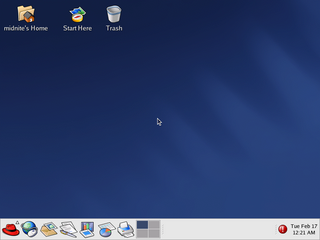
Red Hat Linux was a widely used commercial open-source Linux distribution created by Red Hat until its discontinuation in 2004.

Gentoo Linux is a Linux distribution built using the Portage package management system. Unlike a binary software distribution, the source code is compiled locally according to the user's preferences and is often optimized for the specific type of computer. Precompiled binaries are available for some packages. Gentoo runs on a wide variety of processors, including x86, PowerPC, SPARC, DEC Alpha, ARM, MIPS and PA-RISC.
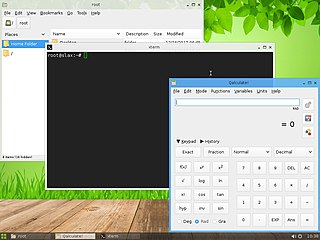
Slax is a LiveCD Linux distribution developed by Tomáš Matějíček and based on upstream customizable Linux distributions. Packages can be added by apt package manager or can be prepared as modules. The tagline for Slax refers to itself as "your pocket operating system".
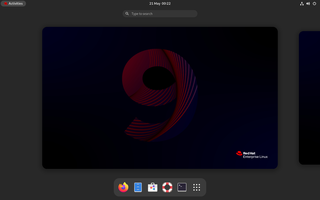
Red Hat Enterprise Linux (RHEL) is a commercial open-source Linux distribution developed by Red Hat for the commercial market. Red Hat Enterprise Linux is released in server versions for x86-64, Power ISA, ARM64, and IBM Z and a desktop version for x86-64. Fedora Linux and CentOS Stream serve as its upstream sources. All of Red Hat's official support and training, together with the Red Hat Certification Program, focuses on the Red Hat Enterprise Linux platform.

CentOS is a discontinued Linux distribution that provided a free and open-source community-supported computing platform, functionally compatible with its upstream source, Red Hat Enterprise Linux (RHEL). In January 2014, CentOS announced the official joining with Red Hat while staying independent from RHEL, under a new CentOS governing board.
Puppy Linux is an operating system and family of light-weight Linux distributions that focus on ease of use and minimal memory footprint. The entire system can be run from random-access memory (RAM) with current versions generally taking up about 600 MB (64-bit), 300 MB (32-bit), allowing the boot medium to be removed after the operating system has started. Applications such as AbiWord, Gnumeric and MPlayer are included, along with a choice of lightweight web browsers and a utility for downloading other packages. The distribution was originally developed by Barry Kauler and other members of the community, until Kauler retired in 2013. The tool Woof can build a Puppy Linux distribution from the binary packages of other Linux distributions.

VectorLinux, abbreviated VL, is a Linux distribution for the x86 platform based on the Slackware Linux distribution, originally developed by Canadian developers Robert S. Lange and Darell Stavem. Since version 7 the Standard Edition is also available for the x86-64 platform, known as VLocity64 7.
Blackdown Java was a Linux port of Sun Microsystems's Java virtual machine, developed by a group of volunteers led by Juergen Kreileder, Steve Byrne, and Karl Asha, and included a team of volunteers from around the globe. The first version, 1.0.2, was released in October 1996, predating Sun's official Linux port.
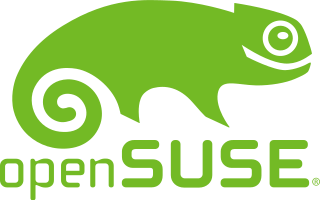
openSUSE is a free and open-source Linux distribution developed by the openSUSE project. It is offered in two main variations: Tumbleweed, an upstream rolling release distribution, and Leap, a stable release distribution which is sourced from SUSE Linux Enterprise.

SUSE Linux Enterprise (SLE) is a Linux-based operating system developed by SUSE. It is available in two editions, suffixed with Server (SLES) for servers and mainframes, and Desktop (SLED) for workstations and desktop computers.

BackTrack was a Linux distribution that focused on security, based on the Knoppix Linux distribution aimed at digital forensics and penetration testing use. In March 2013, Khaled Baoween (Kali) & the Offensive Security team rebuilt BackTrack around the Debian distribution and released it under the name Kali Linux.
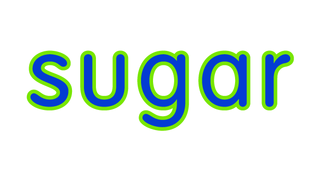
Sugar is a free and open-source desktop environment designed for interactive learning by children. It was developed by SugarLabs. Developed as part of the One Laptop per Child (OLPC) project, Sugar was the default interface on OLPC XO-1 laptop computers. The OLPC XO-1.5 and later provided the option of either the Gnome or Sugar interfaces.

Linux Mint is a community-driven Linux distribution based on Ubuntu, bundled with a variety of free and open-source applications. It can provide full out-of-the-box multimedia support for those who choose to include proprietary software such as multimedia codecs. Compared to Ubuntu, it uses the Cinnamon interface in the most popular edition, using a different, more traditional layout that can be customized by dragging the applets and creating panels. New applets can also be downloaded.
MCC Interim Linux was a Linux distribution first released in February 1992 by Owen Le Blanc of the Manchester Computing Centre (MCC), part of the University of Manchester. It was the first Linux distribution created for computer users who were not Unix experts and featured a menu-driven installer that installed both the kernel and a set of end-user and programming tools.

Bharat Operating System Solutions is an Indian Linux distribution based on Debian, with Its latest stable version is 9.0 ("Urja") which was released in February 2021.

Bodhi Linux is a light-weight Linux distribution based on Ubuntu that uses an Enlightenment DR17-based fork called Moksha as its desktop environment. The philosophy for the distribution is to provide a minimal base system so that users can install the software they want. In turn, the distribution only includes software that is essential to most users, such as a file manager (Thunar), a terminal emulator (Terminology), and a web browser. To install additional software, Bodhi Linux developers maintain a browser-based app store that uses apturl to install programs.

Manjaro is a free and open-source Linux distribution based on the Arch Linux operating system that has a focus on user-friendliness and accessibility. It uses a rolling release update model and Pacman as its package manager. It is developed mainly in Austria, France and Germany.
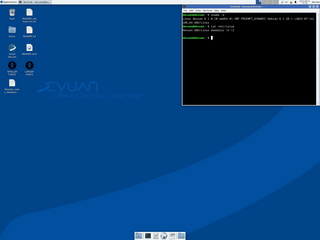
Devuan is a fork of the Debian Linux distribution that uses sysvinit, runit or OpenRC instead of systemd. Devuan aims to avoid "lock-in" by projects like systemd and aims to maintain compatibility with other init systems to avoid detaching Linux from other Unix systems.
The T2 SDE is an open source Linux distribution kit. It is primarily developed by René Rebe.

Q4OS is a light-weight Linux distribution, based on Debian, targeted as a replacement for operating systems that are no longer supported on outdated hardware. The distribution is known for an addon called XPQ4, which adds themes intended to replicate the look and feel of Windows 2000 and Windows XP.















